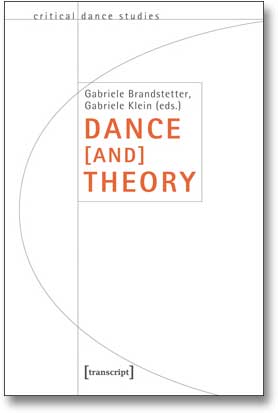

Dance [and] Theory is not a book to review in a traditional sense. It resists such a treatment. Mainly due to the numerous and manifold issues raised: Issues that demand time and space, contextualisation, as well as many mental and physical moves among complex subjects and questions. In fact, subjects and questions which reach far beyond the immediate field of focus, and easily could be subjects for conferences of their own. The reader finds herself theorising on theorising, reflecting on reflections, turning and returning in different directions and circles. This is because Dance [and] Theory, in itself pinpoints discourses, agencies, and theories, practices of which of course you can argue and present opinions — however not review. To put it simply it is all about what are we talking about when we talk. What are we doing when we do, create, think, and act? What are the relations between dance and theory, what happens when these intertwine? Positioned in the middle of crisis, the need to define and redefine who we are and what we do in a world of global capitalism seems urgent.
Dance [and] Theory is a collection of texts derived from an indeed ambitious conference held at Uferstudios in Berlin in 2011, and organised by Gabriele Brandstetter and Gabriele Klein, the editors of the volume. The conference, which started a year ahead with a workshop followed by further discussions and planning within the panels, “was designed to open up a broad field of thought, to pose new questions and to develop flexible structures and open systems” (Brandstetter and Klein 2013, 13). From various themes and perspectives, well renowned and experienced artists, scholars, dramaturges, archivists – or why not label all researchers – active within the field of dance take a closer look at fusions, confusions and contradictions, politics and politicisation, theory and practice/critical practice, when identifying, defining and discussing what is currently debated. How paradigms shift, negotiate, relate, disconnect and disrupt. How educational, political, cultural and economic structures change and “the field” becomes part of these structures, either as advocates or as possible adversaries, or keeps alive by resisting being categorised. Each theme, and/or topic, begins with a lecture, followed by an introduction, a panel, and concludes with a response. Lectures give historical backgrounds like Susan Leigh Foster’s enlightening opening “”Dancing and Theorizing and Theorizing Dancing” that takes us back to Antiquity, from where she follows complex trajectories of notions and understandings of theory within different structural bodies over time, showing the complexity of a concept continuously reshaping. The panels hold a wide spectrum of discussions related to and within dance [and] theory, choreography, politics, geopolitical mobilisation and social change; the multitude of angles that alter the conditions for artists and scholars.
The choreographers/dancers in their lived contexts and social relations, the body/subject in its own corporeality and materiality is at core (even if not vocally so). The book depicts how emerging new formations where authorship has vanished in favour of the collective have broken the old hierarchical modes of working. Dance [and] Theory raises questions strongly connected to politics and society, not least with neoliberalism and late-capitalism as backdrops. In ”A Few Remarks about Research in Dance and Performance or — The Production of Problems”, Bojana Cvejić brings forward among other things production practices, “knowledge production” and differentiation among artistic forms. What are the relationships between research and presentation? How are we dealing with new forms of institutionalising? Other matters concern how dance theory can take place and define itself as critical practice by for instance critical inquires in defining implications and present propositions.
I catch myself smiling when finding references to persons who strongly have been a factor in developing “dance studies” like Randy Martin, who in the late 90s, introduced and formed “critical dance studies”. Post-Fordism, bio-politics, Rancière and Agamben are central, however, none of the authors relate “critical theory” to for instance Marxism and Marxist theory. In the Post-Fordian era production is not locked in the factory any more, production is everywhere in society. We produce within an immaterial sphere, where subjects turn exchangeable objects in the circuit in which we all participate. I keep on recalling for instance Paolo Virno, who in A Grammar of Multitude argues, “capitalists buy the capacity for producing as such, and not simply one or more specific services” (Virno 2004, 82). What we are “selling” is a possibility rather than a product. This means that capitalism has to engender potentiality, which is at the same time dangerous - as it is it cannot be conducted. This dynamism is necessary for social movement, for the productivity to continue. What materialises in my mind is that we are producing a “commodity” that never survives its own production and forms a rather depressing image, which contours get sharper and sharper: we all work in the social factory, which has no outside (or inside).
Dance [and] Theory offers an important addition to current discussions that encourage further debate. Dance [and] Theory opens up to continue debates, questionings, and problematizing. It brings forward the social/historical/cultural/performing backgrounds wherein lies the present. Whether it goes towards the future as well is left open.
An approach is to read the volume from cover to cover, by doing so it turns into a thriller where the reader becomes the detective. The themes and topics are clearly separated, yet critical readings across as well as within the sections make the volume an almost never-ending reading. It generates more nodes or spaces, making possible new encounters in creative and intellectual networks.
References
Brandstetter Gabriele and Klein Gabriele, eds. 2013. Dance [and] Theory. Critical Dance Studies, Vol 25. Bielfeld: Transcript Verlag.
Virno, Paolo. 2004. A Grammar of the Multitude. Cambridge: Semiotext(e).
BIOGRAPHY
Cecilia Malmström Olsson, Ph.D. is a freelance scholar, writer, lecturer, advisor and has been active within the field of dance, culture, education for 25 years in Sweden, Scandinavia, Europe and the US. Her main research focus has been dance and politics from various perspectives.